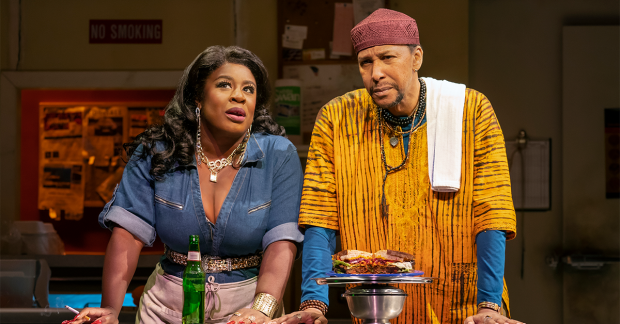Interview: Ron Cephas Jones on the Art of Cooking and Acting in Clyde's
Jones returns to Broadway after a multi-year absence.
Ron Cephas Jones, one of the mainstays of the New York theater scene, is back on stage at last. It's been a while since last we saw him on Broadway — in Of Mice and Men in 2014 — but with good reason. Shortly thereafter, he landed the TV role that would garner him acclaim and make him an Emmy winner, William Hill on This Is Us.
In Lynn Nottage's Clyde's, a Second Stage production at the Helen Hayes Theater, Jones plays Montrellous, who was formerly incarcerated and now works alongside a motley crew at a roadside sandwich joint. It's his goal to create the perfect sandwich, and the wisdom he imparts on his younger co-workers inspires them to do the same. Here, Jones talks about building the character, and knowing his way around the kitchen.

(© Joan Marcus)
This interview has been condensed and edited for clarity.
How did this play come into your orbit?
I hadn't been back to New York to do any kind of boards work in six years and I wanted to do a play, but it was about timing. When everything started to come back to life, Lynn emailed me and said, "I have this play and I want you to do the role." And that, pretty much, was that. It was just a matter of making sure I had the time available. It worked out that I got an opportunity to work on Law and Order: Organized Crime while I was here, so I got two gigs at the same time, doing double duty for a couple of weeks. Both productions were very cognizant of one another, and it just felt good for my work to be wanted on two different, really fantastic projects.
Knowing Lynn's work, and the general heaviness of her plays, Clyde's, which is relatively lighter than something like Ruined or Sweat, wasn't what I expected it to be.
I read the script and I was like, "Oh, wow." It's so different and unique in the ways she found the humor and the behavior of the characters. She was able to find some political and social issues that she writes so profoundly about but make it funny — and not in a jokey way, but in a way where the humor comes out of the difficulties of life and how people respond to it. I love, as an actor, being able to play those types of characters.
How did you go about building your version of Montrellous, the wise older man of the sandwich shop?
Montrellous views sandwich making as an art. It's a vision. It's a way of elevating his mind and spirit. There were so many different elements of this man that were in me already that I really didn't have to go far to find him. I grew up in a restaurant — my mother and father owned a bodega store when I was young in the '60s and '70s. We had a meat slicer and we would make hot dogs and hamburgers and sandwiches, so I was familiar with handling food and I used a lot of that. There were also five different men who were ex-convicts that I grew up with, or people in my family who have that sort of self-made intellect.
Did they give you kitchen prep time in rehearsal to make sure the cooking looked realistic?
Kate Whoriskey's husband, Daniel Breaker, is a culinary man, so he came in and made sure that we were holding the knives correctly and learning how to chop spices and different vegetables. There's a beauty and art in that, as well. I worked a lot on that with knives at home to make it look seamless.
I want to talk, also, about the streaming production of Krapp's Last Tape that you did for the Old Globe earlier this fall. That's not a play you see very often these days.
Ah, existentialism. When I was doing the Katori Hall play Hurt Village, the director, Patricia McGregor, and I became good friends and we started talking about all these different plays she wanted to do. I've always wanted to explore the existentialists because of the mind-blowing stuff that goes in in trying to wrangle with it. I read Martin Esslin's book Theater of the Absurd and I performed in the Ionesco play The Lesson in college, and somehow it always stuck with me.
She was down at the Old Globe with Barry Edelstein and they were doing a Covid workshop. I was in Los Angeles, and we just started talking about Krapp's Last Tape. We decided to do a version of it on tape, and then maybe do a short film, and then take it onstage. Right now, we're in the next phase and we're going to do it again. We want to do it with a live audience, we just have to figure out if we want to add another one-act to it or extend it with music and visuals.
It's heavy stuff, but I think we hit it. We had an audience of like 50 people from the staff and friends of the Old Globe, and it was a big hit for us. We felt like the audiences are ready for something like this. Barry was open arms and he's gonna do whatever he can to help us bring it back and do something with it. We've also been talking to Oskar Eustis about bringing it to the Public, as well. So you'll see it again in the future.









